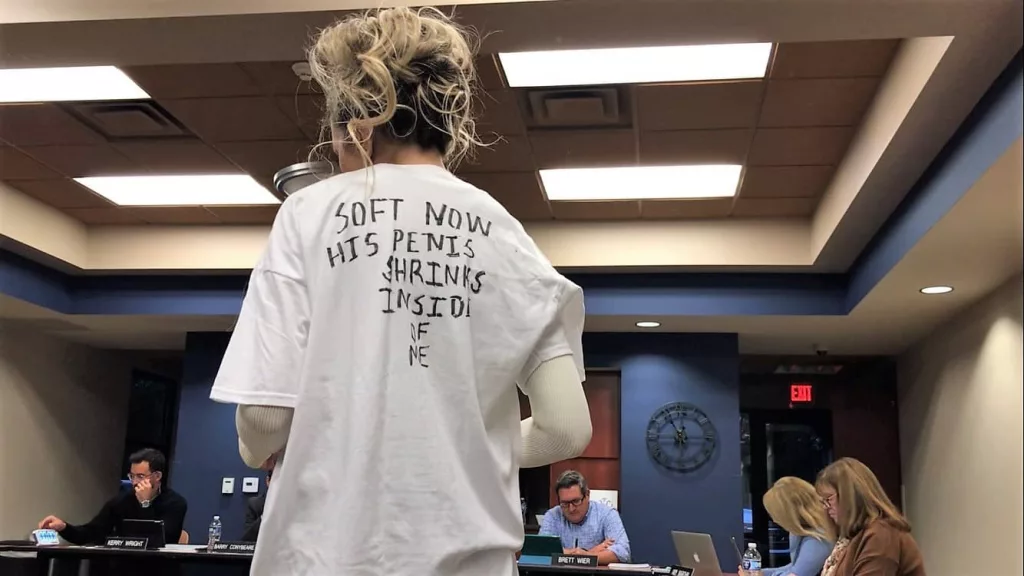To ban or not to ban, that is the question now facing a review committee in one local school district.
From concerned parents to a forensic psychologist and a leader from OutCenter, community members flooded the SJPS Board meeting Monday to share their opinions on what has become a contentious question in schools across the country – Should public schools ban books with sexual content?
The issue has been brewing since school returned to session in August, when district parent Valerie Gehrke asked the district to be aware of a book she felt was pornographic in nature.
Most of the community outrage is aimed at a book called What Girls are Made Of by Elana K. Arnold. The book is a 2017 National Book Award for Young People’s Literature Finalist, and the National Book Foundation described the book as an examination of what it means to be a girl, a woman and a physical object.
At the August meeting, Gehrke strongly disagreed with the book being on school shelves, saying the book was too sexually explicit for children to be reading.
“It was pornography,” she said. “It’s nothing I would ever want my daughter or son or any other child reading. It made me think about … the content level that might be accessible to our students.”
What Girls are Made Of does include graphic descriptions of sexual content, which one community member demonstrated Monday by wearing a homemade t-shirt with an excerpt from the book, which read “soft now, his penis shrinks inside of me.”
“I’ve never seen a school system work so hard to hypersexualize kids,” said the commenter. “What happened to respect and abstinence?”
Trish Kovac – a mother of three St. Joseph students with a master’s degree in clinical psychology – spoke against the banning of any books, and specifically addressed the claims against What Girls Are Made Of.
“I have been a case manager at a residential teen pregnancy home with clients who bore their babies as young as 12 and 13, and they could have used a book like What Girls are Made Of,” she said. “I work with child and teen victims of sexual abuse and victims of sexual abuse and exploitation, and have observed dozens of their forensic interviews. … I am disgusted that people from this parent activist group are accusing [Board of Education] members of exposing kids to pornography, committing child exploitation and sexually indoctrinating them.
“These are grave and serious accusations, and I’ve seen these actual behaviors in real life against my victims and they are atrocious. This is not what is happening in our schools.”
https://www.facebook.com/wsjmfm/videos/869542354068211
Community member Alan Lutz asked the school board if they had a moral compass.
“I hope, if you do, that it’s calibrated properly,” he said. “The moral compass of this country is off, and please use your influence to bring it back. The pornography is not part of our world, our United States of America. Please use your moral compass, and put it to work using the gospel as the truth.”
Gerik Nasstrom, program coordinator for the OutCenter of Southwest Michigan, offered his perspective.
“I was a pastor in this community,” Nasstrom said. “So, I can assure you the Good Book has plenty of really great quotes that you can mine to make it seem like this evil book.”
He then quoted Ezekiel 23:20, which states “There she lusted after her lovers, whose genitals were like those of donkeys and whose emission was like that of horses.”
“Now, the Bible’s a great inspirational book for many people, but it has context that shows many quotes that would be horrifying,” Nasstrom said. “I’d love to see that written on a t-shirt because the Bible, just like any book, has content that when you take it out of context, it can sound horrifying and not age-appropriate. But, when you look at it in context, you see the life-giving stories.”
He also mentioned William Shakespeare, as well as books like Of Mice and Men, The Things They Carried, Tom Sawyer and The Adventures of Huckleberry Finn as examples of literature with “difficult topics” that are regularly accepted in school curriculums.
“You see stories like the ones that I listed of teens going through traumas and helping teens deal with those things that they may be going through in their day-to day-life,” Nasstrom said. “That’s why these books are so incredibly important.”
Former district teacher Tiffany Wood said it’s a slippery slope once books start getting banned.
“I think that when we talk about people as ‘other,’ that starts making people feel like they’re unworthy,” Wood said. “That’s not okay. … We need people to know that they’re safe, and we need people to be able to express how they learn in whatever way they’re going to learn best, because they’re not here just to be in school here. They’re here so that they can be great out in the world.”
District response
After being informed by the district of a formal process to challenge books, Gerhrke has since challenged 15 books in the school’s library.
District Superintendent Jenny Fee said only 11 of those books are in circulation, but the district will now review each title per policy. She said the review committee has been set up, and there are seven or eight people on the committee, including media center specialists, subject area specialists and community members.
“The committee has met to talk about process, and to make sure the books are read completely and holistically,” said Fee, adding that a written report will be submitted by Nov. 11.
Fee also reminded parents that the district has a process in which any parent can talk with a building administrator or media center specialist to notify them when their child check out specific titles.
“There’s over 65,000 books available to our students to read and understand the world,” Fee said. “I think that is an incredible resource for our students as they learn, grow women to become citizens in our world.”
Both Fee and school board president Barry Conybeare also applauded the public commenters for their civility during the meeting.
“I do appreciate the respectful nature of the conversation tonight,” Conybeare said. “We’ve seen on media across the country a lot of board meeting that have been pretty ugly. I’d like to think that we as a school district can rise above that.”






